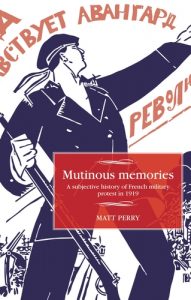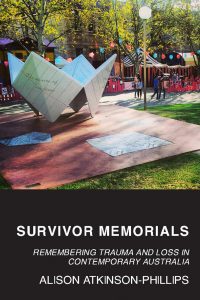A sizeable audience gathered in the Armstrong Building on Wednesday 5 June for the joint launch of two exciting new publications by members of the Oral History Unit & Collective: Research Associate Alison Atkinson-Phillips’s Survivor Memorials: Remembering Trauma and Loss In Contemporary Australia (University of Western Australia Publishing) and Reader in Labour History Matt Perry’s Mutinous Memories: A Subjective History of French Military Protest in 1919 (Manchester University Press). Jack Hepworth reports.
Opening the event, Professor Helen Berry, head of History, Classics & Archaeology at Newcastle University, paid tribute to both works, situating them in recent developments in scholarship: connecting social theory perspectives, the turn to affect, and memory studies. Helen remarked on the dynamism of the analytical approaches in evidence in both works.
Both authors introduced their work before taking questions from an engaged audience. Linkages between the two books emerged. Mutinous Memories explores French mutineer subjectivity during eight months of protest in 1919. Matt explained how he approached mutineer testimony as multi-layered sensory experience. He elaborated how analytical frameworks and theoretical concepts from Voloshinov, Vygotsky, and Bakhtin furnished his approach to mutineer consciousness. Alison discussed case studies from her work, and elaborated its theoretical orientation, exploring ‘difficult knowledge’, historical restitution, and transitional justice.

Mutinous Memories by Matt Perry
Matt described memory’s processual quality, evidenced through ongoing contestation around memory of the mutiny in French politics today. In the mid-twentieth century, the state censored records of the mutiny; today, radicals cite the events of 1919 as a foundation stone. He also situated his work in the history of the emotions, discussing what mutineer representations of their experiences suggested about their broader social world.
Alison highlighted the liveness of the political debates which her work addresses in contemporary Australia. Survivor Memorials addresses how and why ‘communities of memory’ remember trauma and loss. The book explores memorials connected to neglect, discrimination, abuse, and Australia’s colonial history. This ‘memory work’ persists today, amid debates at the core of conceptions of identity and nationhood in Australia.

Survivor Memorials by Alison Atkinson-Phillips
The event closed with responses and questions from Jack Hepworth, who invited the authors to discuss how their works critically engage with memory’s interaction with nostalgia, and with institutional co-option. Alison discussed nostalgia in relation to survivor memorials charting migrant experience, and the entangled narratives around being ‘grateful’ to a nation. Matt spoke about nostalgia’s different forms – regenerative, restorative, redistributive – and how the left mobilised memory of the mutiny to these ends. He also alluded to cases of ‘mutineers’ embellishing and exaggerating their historical roles in the mutiny.
The breadth of interest in these two new books at a busy launch attested the vitality of a research environment connecting memory, oral history, social contestation, and subjectivity. Fittingly for two thought-provoking, innovative works of wide-ranging scholarship, the evening was a great success.
